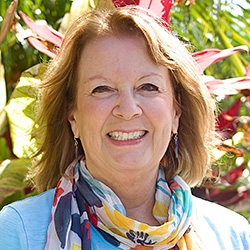

Search Results: focusing
-
Hi friends, My name is Itzel and I’m happy for this opportunity to share a bit about myself and how I came to teach NVC. I was an activist before I knew what the word meant. When I was a child, I often argued with the adults around me about what I thought was “right.” If I had a nickel for every time a grown-up said to me, “You should be a lawyer,” I probably would’ve collected enough money to pay for the law school education that I eventually got. I left my traditional legal career path after more than a decade to become a...
-
First, on the personal side… I’ve already planted half of my vegetable garden and it was so completely enjoyable. Remember how challenging this was for me a couple of years ago? My inner jackal did have a few things to say this year, but not nearly as many as in past years. And, I gave her loads of empathy so we made it through. I am thrilled about this. I can’t wait to see my seedlings pop up! If it’s a successful garden, I’ll share pictures in a future letter.
-
- Learn tips and strategies to ensure ALL voices are heard
- Grow your capacity to name and address power dynamics
- See how prior assumptions and perspectives impact how groups work together
- Explore facilitation components using a caring for all, power-with lens
-
“The Embodied Spirituality of Nonviolent Communication” is an introduction to NVC created from recordings of trainings Robert Gonzales offered in Hawaii in 2007 on the islands of Maui and Kauai.
This collection is a celebration of Robert's life and one way we can honor his outstanding work.
The original product was a set of DVDs. NVC Academy has converted the original 3 DVD set into 5 mp4 videos. We have taken care to preserve the original product while simultaneously upgrading to HD video and remastering the audio in this new mp4 format.
-
- Focus on living from the inside out
- Bring a field of inner kindness to your inner distress
- Attend to your inner experience with compassion
- Cultivate an inner spaciousness of freedom
-
- Gain a deeper insight into the spiritual practice of NVC as taught by Robert Gonzales
- Enhance your emotional intelligence and self-compassion
- Learn compassionate self-talk techniques and cultivate more inner peace
- Approach change with a peaceful mindset, rather than anxiety and fear
-
Dear friends,
I greatly enjoyed my annual New Year’s Peace Meditation yesterday. It always brings together NVC enthusiasts from across the world and is one of my favorite traditions for welcoming the New Year!
How was 2024 for you? For me, it was a bumpy ride. There were moments of joy spending time with our 3-year-old grandson, mine and Kim’s first international trip together (a bonafide vacation that was void of work), and precious time with family and friends. There was also heartbreak...
-
Dear friends,
Happy April Fool’s Day, which, according to Wikipedia, “is an annual custom on April 1st consisting of practical jokes and hoaxes.” I always think of my Mom on April Fool’s Day. She was mostly a stern person who scorned practical jokes, but on April Fool’s Day, she would play hoaxes on my father. One year, she sewed his boxer shorts’ fly shut. Another year, she reorganized all the drawers in their bedroom. Both of these really made me laugh because it was so out of character coming from her! This April 1st, I do not want to play a trick on anyone, but I do want...
-
In this inspiring video, Robert Gonzales, veteran CNVC Certified Trainer, talks about his personal search to integrate spirituality into his daily life, and how Nonviolent Communication provided the missing link for this integration and has become the focus of his work.
-
CNVC Certified Trainer Gina Cenciose guides listeners through a 20-minute guided self-empathy meditation.
-
Mary Mackenzie, renowned CNVC Certified Trainer, shares her understanding and experience of empathy.
-
Conversation can become more satisfying with depth. Depth is occurs when connection unfolds towards a depth of intimacy, presence, attunement, sensing -- and silent attentive connection where another is attentively seen and heard. Inviting this level of sharing in conversation relies on at least three major elements: attentive silence, the desire to connect and be known, and focus on present moment experience. Learn more about this way of engaging.
-
Do you want to increase your capacity to identify and connect with feelings and needs? Would you like to enhance your ability to translate judgments? Join Miki for this deep dive into feelings and needs.
-
How much money to pay? And how much money to ask for? The supply and demand logic basically say that we ask for the most that “the market can absorb” and pay “the least that we can get away with.” We can instead, we can engage in experiments that focus on connecting to and satisfying needs. We can also engage with our varying degrees of access to resources within the existing economy and consider how we want to make choices about resources, especially when we have access to power.
-
Why is it so difficult to not take things personally? It's because everything reinforces the sense that whatever is being said is indeed about us – both from without and from within. However, we can get better at not taking things personally with a practice of shifting our focus by being open to multiple interpretations, understanding that our reaction is about our own need, and noticing how the other person’s words, no matter how they sound to us, are an expression of their needs. We can then be more present and available to navigate the situation.
-
Most of us subject ourselves to so many painful mental jabs and they seldom stimulate helpful change. We can be like a frustrated animal trainer repeatedly whipping an animal, without ever helping the animal to understand what behavior is wanted or offering encouragement. Instead, punishing thoughts can be stepping stones to awareness. We can focus on sensing what we're really aspiring to. This is more likely to eventually produce sustainable change that'll serve us better.
-
Attraction to others is neither good nor bad. Although it's pleasurable it doesn’t necessarily help with wise discernment. When it arises, it's up to you to engage in wise discernment about how you manage it. This guide provides practices and points of focus to engage your own attraction in a way that holds more choice about what will meet needs for yourself and others, and what role attraction plays.
-
If we are to transform the existing social order, and shift to a mode of liberation for all, we'll need to look at our own participation in it. This includes how much we are able to focus on keeping our hearts open; speak to impact without attributing intention; and retain a humility that includes our systemic context. Read on for "how to" when we are in a position of less power.
-
In some situations you might expect people to show a degree of maturity or skill. When they don't, your anger-fueled response doesn't lead to lasting improved relationship change. Instead, find someone who retains focus on your feelings and needs rather than colluding with you about what should(n't) be. This can support greater acceptance, grief, vulnerability, groundedness and discernment, from which next steps can arise.
-
To resolve conflict, information of what's important to each party, plus corrections, needs to be included and built upon. Here we explore nine patterns of ongoing conflict, including diagnosis; assuming understanding; refuting; unhelpful communication mediums; over focus on intent over effect; and “hit-and-run” engagement. This is part one of a two part series.

Quick Links
Subscription Preferences
Stay In Touch!
Looking for ways to keep up with NVC Academy news, get special offers, free resources, or words of inspiration? Here are five ways to stay engaged:















